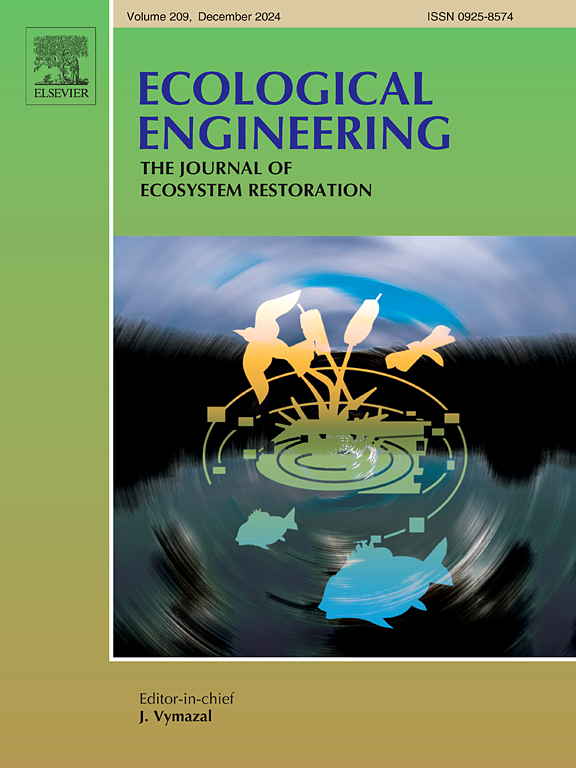A promising approach for soil remediation and revegetation of gold mines in the Chocó biogeographic region of Colombia
IF 4.1
2区 环境科学与生态学
Q1 ECOLOGY
引用次数: 0
Abstract
Soils degraded by gold mining lose essential properties for vegetation growth, necessitating effective rehabilitation strategies for ecological restoration. This study evaluated soil management treatments to enhance assisted and natural revegetation in gold-mined areas of the Chocó region, Colombia. Three treatments were tested: loosened soil amended with 8 kg/m2 of poultry litter, only loosened soil, and untreated soil as a control. In two 12.5 m2 plots per treatment, 24 seedlings of Cespedesia spathulata and Acacia mangium were planted, and soil fertility and seedling survival and growth were monitored for one year (September 2013–September 2014). After 11 years (October 2024) of natural succession, species richness, diversity, and composition of woody vegetation were also assessed. The soil treatment with poultry litter significantly improved soil fertility (e.g., organic matter, calcium, and phosphorus levels) and enhanced A. mangium growth compared to soil loosening treatment and control plots. Survival rates exceeded 90 % for both species across all treatments. After 11 years, the plots with poultry litter had higher species richness and diversity and a more complex woody species composition than those with loosened soil and control plots. These findings highlight the efficacy of poultry litter in restoring soil function and promoting long-term forest resilience in tropical ecosystems degraded by gold mining.

哥伦比亚Chocó生物地理区域金矿土壤修复和植被恢复的一种有前景的方法
金矿开采导致土壤退化,失去了植被生长的基本特性,需要有效的生态恢复策略。本研究评价了加强哥伦比亚Chocó地区金矿地区辅助和自然植被恢复的土壤管理措施。试验了3种处理:疏松土壤加8 kg/m2的家禽粪便,仅疏松土壤和未处理土壤作为对照。在每个处理2块12.5 m2的地块上,种植鸡血藤和马相思幼苗24株,监测土壤肥力和幼苗存活生长1年(2013年9月- 2014年9月)。经过11年(2024年10月)的自然演替,对木本植被的物种丰富度、多样性和组成进行了评价。与土壤松动处理和对照区相比,家禽凋落物处理显著提高了土壤肥力(如有机质、钙和磷水平),促进了马头松的生长。在所有治疗中,两种物种的存活率都超过90%。11年后,有家禽凋落物的样地物种丰富度和多样性高于松散土壤和对照样地,木本物种组成更复杂。这些发现强调了在因金矿开采而退化的热带生态系统中,家禽凋落物在恢复土壤功能和促进森林长期恢复力方面的功效。
本文章由计算机程序翻译,如有差异,请以英文原文为准。
求助全文
约1分钟内获得全文
求助全文
来源期刊

Ecological Engineering
环境科学-工程:环境
CiteScore
8.00
自引率
5.30%
发文量
293
审稿时长
57 days
期刊介绍:
Ecological engineering has been defined as the design of ecosystems for the mutual benefit of humans and nature. The journal is meant for ecologists who, because of their research interests or occupation, are involved in designing, monitoring, or restoring ecosystems, and can serve as a bridge between ecologists and engineers.
Specific topics covered in the journal include: habitat reconstruction; ecotechnology; synthetic ecology; bioengineering; restoration ecology; ecology conservation; ecosystem rehabilitation; stream and river restoration; reclamation ecology; non-renewable resource conservation. Descriptions of specific applications of ecological engineering are acceptable only when situated within context of adding novelty to current research and emphasizing ecosystem restoration. We do not accept purely descriptive reports on ecosystem structures (such as vegetation surveys), purely physical assessment of materials that can be used for ecological restoration, small-model studies carried out in the laboratory or greenhouse with artificial (waste)water or crop studies, or case studies on conventional wastewater treatment and eutrophication that do not offer an ecosystem restoration approach within the paper.
 求助内容:
求助内容: 应助结果提醒方式:
应助结果提醒方式:


